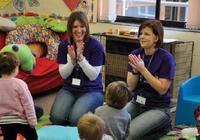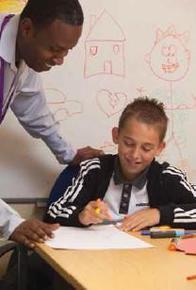
You no longer run children’s homes, so what does The Children’s Society do today?
There are about 12 million children in the UK and clearly we can’t work with them all. So we’ve focused, as our founder did, on working with the most disadvantaged.
We work with tens of thousands of children every year. Some are preschool age, some are in the asylum or refugee system whose refugee status is being challenged. Some have been, or are at risk of being, sexually exploited. Some are young carers.
The first thing we do is work with those children directly to try and improve their lives. But secondly we know that many of the issues those children face can’t be dealt with on a child by child basis – they are structural issues in our society. That’s why we work politically, we’re trying to reshape some of the structures that many children find themselves victims of.
Thirdly we also try and address the public attitudes around those groups. So often the biggest issue we find that children living with disadvantage face is the attitude of other people.
How would you describe those attitudes that you’re seeking to challenge?
It’s been fairly well documented that in some sexual exploitation cases, both girls and boys [have said that] either the police or other professionals can sometimes not listen to children carefully and not respond to what they’re being told.
For children who live in households where there’s low income or poverty, there is often a stigma attached to that. Those children don’t often get the access and opportunities they need in life in order to thrive.
Do you think the Church makes it worse, better, or somewhere in between?
Well, the Church over hundreds of years has often been at the forefront of societal change. New dynamics in society have been engineered and championed by churches. In many places the churches are at the forefront of making those opportunities happen, nationally, locally and at a congregational level. And it’s really important that the Church continues to have the courage to do that; to talk about the type of society we would like to be in the UK and to be people who usher that society in. And [also] to keep talking about the importance and value of human life and human dignity, of every single life being special, and making sure that’s actually delivered at a local level.
If I’m a children’s worker in a church how can I be part of that? How can I help to effect that kind of change in my community?
I think the first thing – and many churches are very, very good at doing this I hasten to add – is look at children in the whole area, not just be focused on the children who happen to be coming to the church. [It’s important to] have a really good understanding of what the context is in which those children are living. It’s important that those children are accurately listened to. The Good Childhood Conversations [project] helps churches listen very carefully to what children have got to say.
Once we know what they are experiencing, we can start to offer services and interventions which will support them. Sometimes it’s just a matter of listening really carefully. Sometimes it’s helping with intergenerational work, helping younger children and older adults to get to know each other a bit better.
In the media right now there is a strong narrative around the poor, that seems to be being won by those that say they’re shirkers and that they should go and get a job. How do you speak against that prevailing world view?

It’s not true and it’s not the reality of how people live their lives. Twenty or 30 years ago about one in eight children in this country was living in poverty. Now it’s about one in four and by 2020 it will be one in three. That’s going in the wrong direction. The vast majority of those children live in families where there is at least one parent working. For those in households where there is no work, many people are desperately trying to find it. So it’s really important for the Church to name the reality of how it really is. The reality today for children living in poverty is that most of them live in a working household.
It’s important to keep on saying why we have a welfare and benefits system in the UK. None of us live in a vacuum, we are all interdependent. People use the health system, they drive on publicly funded roads, they are protected by publicly-funded defence. And it’s right that we as a society support those who need support at a particular moment.
You mentioned the importance of listening to children. What has The Children’s Society found out as it has listened?
We do a lot of listening to children. Every year we publish The Good Childhood Report, which is a large snapshot on what it is like for children living in the UK today. With York University we talk to 40,000 children, and they give us some really interesting insight.
The reality today for children living in poverty is that most of them live in a working household
Last year we found out two significant things: first of all, children’s well being drops dramatically as they become teenagers. The good news is that it picks up again w
hen they’re around 17 or 18, but when children are 13 to 16 it gets consistently worse.
Secondly, after many years of improvement in children’s well being across the whole of UK society, last year it showed a sign of starting to dip again. It’s not good news for children, or for the rest of us, to be in a situation where our children’s experience of living in the UK is getting worse.
Today there are 1 in 4 children living in poverty in the UK. By 2020 it will be 1 in 3.
Tell us some more about how you see poverty affecting childhood.

By the government’s own numbers they are expecting child poverty to increase by 2020. The Institute of Fiscal Studies has shown quite powerfully how that’s going to increase.
There are several implications to this: first of all there’s the financial cost to society. Research suggests that the cost of child poverty to the UK is nearly £30bn a year. These are large sums of public money being used to prop up a system which benefits no one at all.
Secondly, it has a huge social cost on children’s lives. We know that children born in poverty tend to have worse health outcomes as a child. They have significantly lower academic outcomes at 16. They are three times more likely than other children to have mental health problems. We also know that it has significant impacts on their lives as adults.
This increase in inequality is causing a dysfunctional society that benefits no one. So our hypotheses is that we need to find a way to turn that around.
How should churches be responding to the families living in poverty in their parish or nearby?
At a national level the bishops in the House of Lords are really important, as they’re very good [at advocating for children and families].
At a local level it’s important that churches do what they can to engage with the community they’re actually faced with. That means listening carefully to what that community needs, not trying to superimpose onto it what we might like to superimpose.
And, I would say this wouldn’t I, being from The Children’s Society, but being really careful to listen to what children have to say. Our experience is that their perceptions are often very sharp and very powerful. They can start to set a whole agenda locally for what could get
done.
We’ve heard a lot of stats but I’d be interested to hear from your experience what it actually looks like. What effects have you seen of this rising level of poverty on families?
When we ask children they often report things like not taking home an invitation to a party because they know their parents can’t afford for children to come back to their house afterwards. Children report about not going on the school trip and not wanting to embarrass their parents again by asking to use the school fund. It’s children whose parents are literally deciding whether they’re going to have a new coat or a pair of winter shoes. Children are living in cold houses, and parents are making a choice between having enough food and heating the house.
Parents are making a choice between having enough food and heating the house
These are some particular problems at the moment – one of the causes is the benefit cap. I understand that this is politically popular but what most people don’t get to see is its impact. So when families have to move to another part of the UK it breaks up their social networks,
it moves them to another school and it takes them to a place where there is often no social support or family support – that’s not in that child’s interest. Often families are moved to areas where there are higher levels of unemployment and there’s less capacity to get out of the
poverty trap.
We’re also seeing families and children talking about the stigma associated with poverty. They don’t like to talk about it because they feel that they are going to be stigmatised or harassed because of their life situation. And again children often report that they protect their parents from that reality. We also see in many schools that children are coming to school hungry because there’s not enough food in the house for breakfast or for a [packed] lunch. That’s why we’ve been at the forefront of a campaign for every child in poverty to get a free school meal. We know that for low income families getting a free school meal is really important and makes a massive difference to their family budget. And for the child it means that they can have a proper meal, they can study better in the afternoon and they can get at least one hot meal a day.
You’ve mentioned families having to move because of the benefit cap. What could churches do to facilitate a welcome for those families if they are moving into their area?
Many churches have a strong experience of doing that type of thing. The first thing to do is say ‘What do people need?’ rather than ‘What do we want to offer?’ That’s the first question to ask.
If families have come to live in an area and they don’t know the local schools and how the system works, of course friendship and companionship and helping people to feel at home, is really, really important. Practical help like food and those things are also going to give
a sense of welcome and will be very supportive for families.
One would also ask the question ‘Why are people hungry? Why is it that people haven’t got proper housing? Why have people not got a coat?’ And that’s important that the Church is asking those questions as well. So, asking the wider questions and making sure society responds to those, but practically helping families [too], of course those are really powerful things. And many churches are so good at doing it. [That
good work] is based upon what people need, what their needs are rather than what the Church might want to offer. I think that’s the really important thing.




























